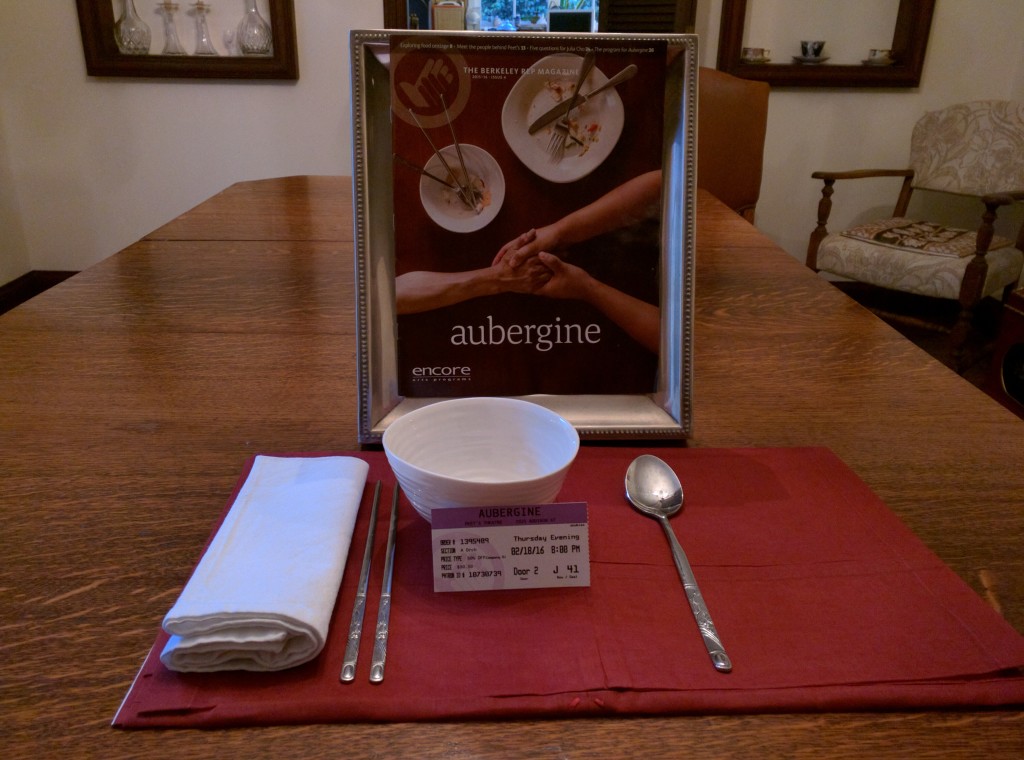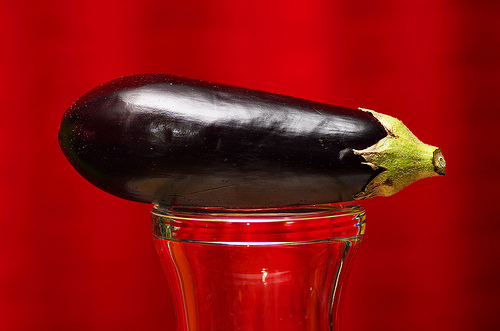Aubergine by Julia Cho

Aubergine by Julia Cho
“Art has two constant, two unending concerns: It always meditates on death and thus always creates life”~Boris Pasternak
I thought about the aptness of this Pasternak quote after attending the play Aubergine. I was fortunate to be the guest of friend Jongneyo Choi and actor Sam Kim. Thank you, Jongneyo and Sam, for a lovely evening!
Berkeley Repertory Theater commissioned Julia Cho to create a play as part of its themed works called The Food Project. The result was Aubergine—an examination of food, family, and memory—featuring a troubled son, an emotionally distant father, and those who love each of them. In Cho’s play, Ray, the child of Korean immigrants, and his father have developed what performance artist Katie Craddock describes as “a contentious relationship with food…a point of tension between the cultural practices the family maintains at home and the ones they encounter outside” (The Berkeley Rep Magazine).
As the play Aubergine opens, a bureaucratic administrator discharges Ray Park’s semi-conscious father from the hospital with vague instructions and disingenuous promises. Now Ray sits by his father’s bed hour after hour reviewing memories and weighing issues of life and death. Many of Ray’s memories focus on food and shared meals—ironic since Ray is a brilliant chef, a sort of food whisperer, whose father never acknowledged his gift.
Food and Memory
John S. Allen, author of The Omnivorous Mind, says “food abundance has become a vehicle for memory enhancement at the cultural level.” There’s a part of our brain, the hippocampus, that processes memory, smell, and emotion. That’s probably where we got the concept of comfort food. Ever need a mac and cheese fix? Unfortunately, for Chef Ray, he finds more conflict than comfort in food, his memories tainted. The inability of his father to connect with the food Ray prepares is representative of his father’s inability to connect with emotion.
Good writing compels readers or viewers to connect themes to their own lives. At intermission, Aubergine got me wondering how food was related to my culture. Suddenly I was transported via my hippocampus (just as the characters are) to my childhood and my own food memories of a summer I spent at my grandmother’s house. I remember ice-cold Mountain Dew in cut-glass tumblers and garden-fresh beet greens steamed and sprinkled with salt and vinegar. And at night my cousin and I walked to the store to buy ice milk. I don’t even think they make ice milk these days. It’s like ice cream, only…you guessed it…made with milk.
Back to the second half of the play. While one or two of Cho’s food metaphors felt a little reductive, in an almost Forrest Gumpian Life-is-like-a-box-of-chocolates vein, the beauty of Aubergine is the way it makes you reflect on life and food and culture and immigration and…death.

Food and Death
Yes, that’s correct.
Food and death. Two opposites, you think. Ah, but remember that convo Hamlet has with his dastardly uncle in which Hamlet connects a worm to a king and death to life? King to worm to fish to man—”two dishes, but to one table.”
I’m not going to tell you how Cho weaves death into the food narrative except to say that in Aubergine, death has a seat at the table (sorry). True to Pasternak’s vision, this play both meditates on death and creates life. And that’s why you should see Aubergine before it ends on March 27th.
What about you? What are your food memories? Which of your food memories evoke emotion? Have you seen Aubergine?
4 thoughts on “Aubergine by Julia Cho”
Beautiful post, Deb. 🙂 Thank you for sharing.
My mother makes this authentic south Indian delicacy called ‘Aviyal’ (mixed vegetable curry). She almost makes it every Sunday. So, we have almost reached that point where Sundays are ‘Aviyal’ days. 🙂
Ah, I’m jealous. I love vegetable curry. I live near a restaurant called House of Curries, and you can often find me and family members there on Sundays. Usually, though, I order vegetable biriyani. Yum. Maybe Berkeley Rep will commission a South Indian play for their food series. I bet you have memories related to certain dishes, too. In the US, we have that other layer of the first generation and second generation immigrant families, which the playwright of Aubergine worked into the play. The son did not speak the father’s language or eat the father’s food. The play reminded me a little of the novel Joy Luck Club. Have you read that?
Good to visit your site as a part of my A to Z visits. My theme Blog Promotion
Welcome to A to Z April Blogging Challenge 2016 – Co-Participant – Nrao – NRao Blogs
@knoltweet
NRao Blogs – 2016 A to Z Challenge Blog Posts
Management Theory Review
Hi Professor,
Thanks for stopping by. I really like what you’re doing on your A to Z challenge. I could definitely use tips on blog promotion!